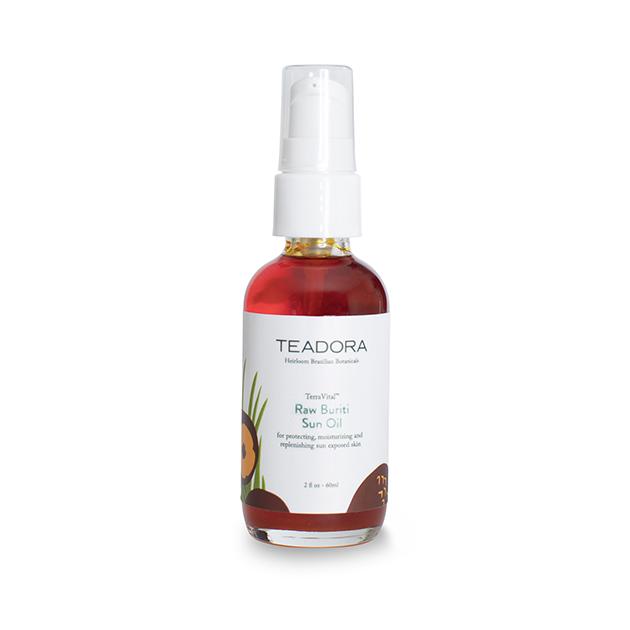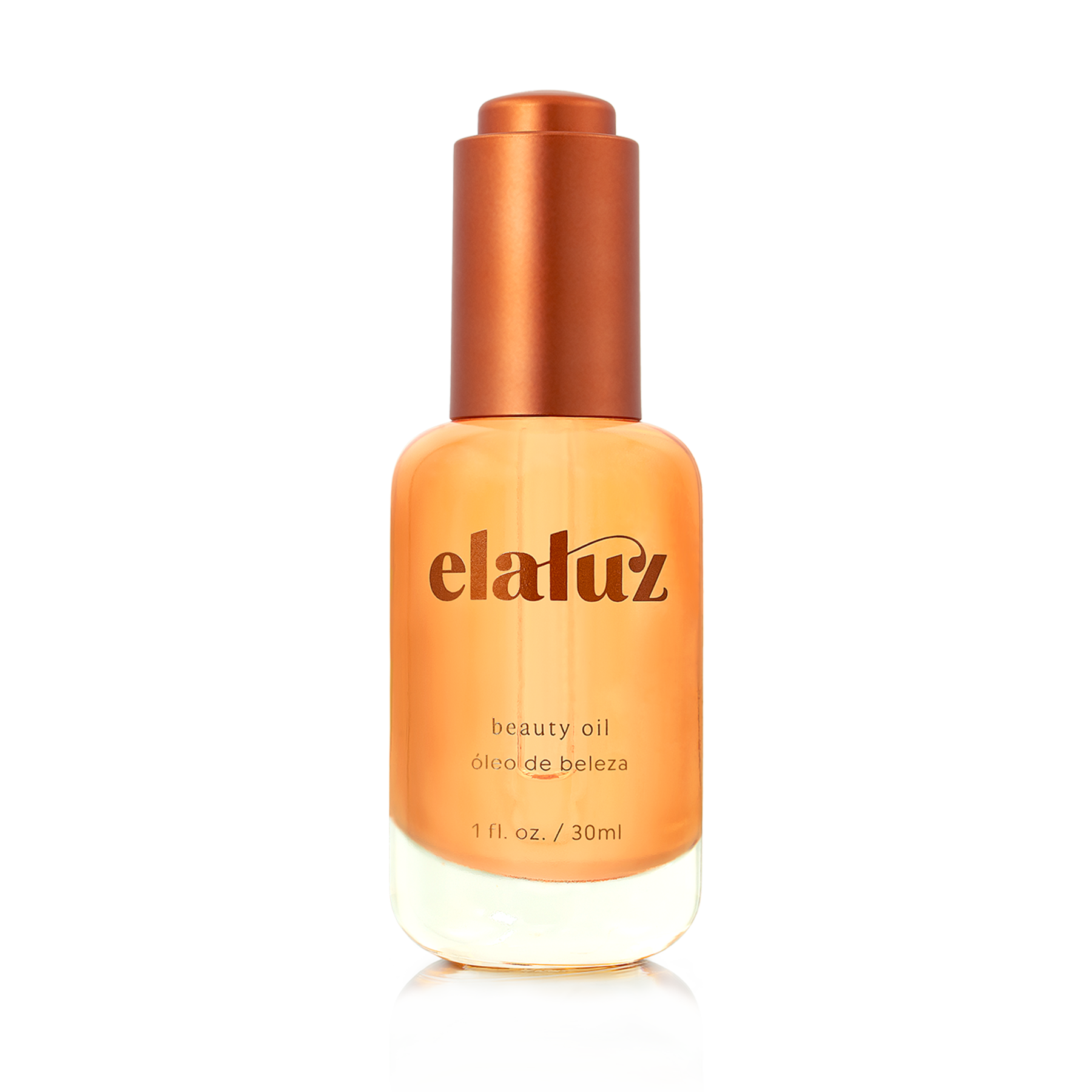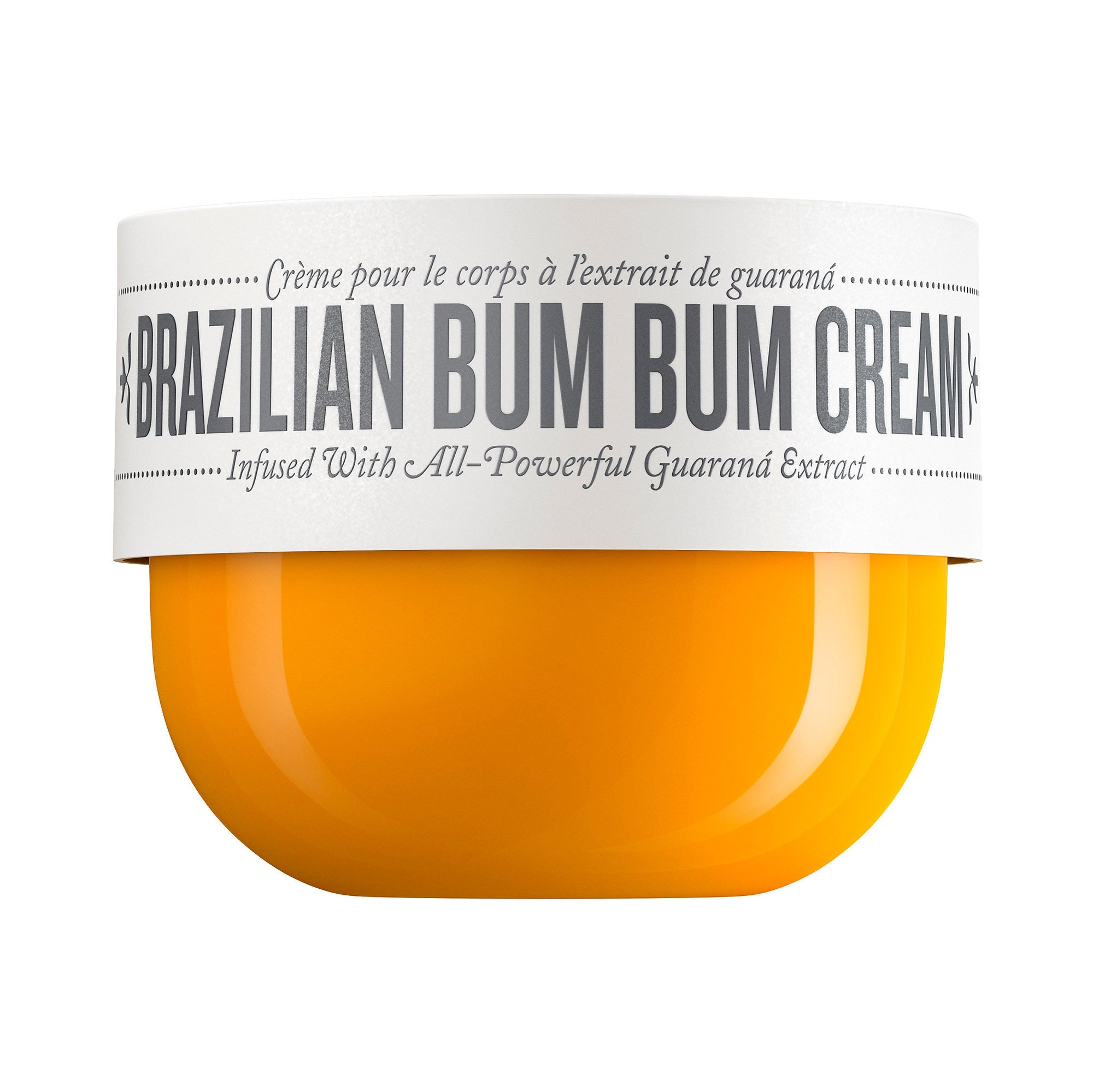Brazilian Women Set The Record Straight On Their Beauty Culture
“I remember being six years old and having to take my passport picture,” fashion and beauty entrepreneur Camila Coelho tells me over the phone. I can hear the smile in her voice as she recalls the moment vividly. “I grew up seeing my grandmother wearing red lipstick all the time, even to cook for us at home, so I asked her for lipstick for the photo.” Coelho's grandmother willingly agreed and handed her a tube of bright crimson lipstick — forever immortalizing Coelho's relationship to beauty and Brazilian culture in a tiny passport photo that she's kept to this day.
AdvertisementADVERTISEMENT
Coelho, who was born in Virginopolis, Minas Gerais, describes her childhood as liberating. “I feel so privileged to live such a beautiful life in a tiny, tropical town,” she says. “It’s the one place in the world where I can genuinely disconnect and be free without being judged.” That freedom is a common thread amongst many Brazilian women, who say that self-expression is deeply embedded in their culture and extends beyond just beauty.
Camila Coelho's childhood passport photo.
"In Brazil, beauty is an attitude," Camila Pierotti, co-founder of Sol de Janeiro, says. "It's a feeling of confidence that is reflected in the way we take care of ourselves." That beauty approach, which is rooted in self-care, has made Brazil the fourth-largest beauty market in the world after the United States, Japan, and China, and has influenced many of the treatments and products we consume globally.
"Brazilian culture is at the core of who we are," Pierotti says of her brand Sol de Janeiro, whose bestselling Brazilian Bum Bum Cream has more than 249,000 "hearts" on Sephora.com. Its name, "bum bum," which translates to butt in English, is an ode to the confidence and care Brazilian people bring to their beauty routines. "We celebrate bodies of all shapes and sizes and we're encouraged to at a young age," she says. "That goes beyond physical beauty and is really evident in everything from our music and art influences."
Camila Pierotti, co-founder of Sol De Janerio.
Valéria Cole, the founder of Teadora Beauty, which means "adore you" in Portuguese, says beauty reflects the rich surroundings of her hometown, Campinas, São Paulo. "It's easy to only attribute Brazil to Carnival, or a barely-there bikini, which is a huge part of the beach culture, but there's so much more," Cole says. "So much of what we consider beautiful derives from nature and the idea of natural beauty."
AdvertisementADVERTISEMENT
You'll find Brazilian culture throughout the beauty industry, from Brazilian waxing and blowouts to lymphatic massages, which were all made popular and still commonly practiced in the South American region. "Knowing the influence that Brazil has on the world makes me feel proud," Coelho says passionately.
But what you see in mainstream media — of tall, curvy women with smooth Victoria's Secret waves, hairless bodies, and bronzed limbs — isn't an accurate depiction of Brazil's authentic beauty culture. "I didn't notice that the things I grew up accustomed to doing were 'Brazilian' until I moved to the United States," Pierotti says. From embracing body hair and natural curls to honoring agriculture and indigenous rituals, Brazilian women are debunking the most common stereotypes and showing just how much beauty is rooted in their rich history.
Body hair is celebrated in Brazil.
While the 'Brazilian wax' has become synonymous with taking it all off, Brazilian women say that's not the case down south. "The service in the United States usually involves the removal of all hair," Pierotti says. "In Brazil, however, we usually don't remove all hair."
The service was reportedly pioneered in the early 1990s by Janea Padilha of the J Sisters Salon in Manhattan, which is run by seven Brazilian siblings. According to a BBC news report, Padilha conducted a DIY waxing experiment, which included removing all of her hair, after seeing a woman in Bahia, Brazil with pubic hair peeking out from her tiny bikini. After convincing peers and friends, the service began to gain popularity in New York City. They coined the term "Brazilian wax" when a rival salon tried to take credit for the waxing service. Jonice Padilha, one of the seven J sisters, says that while defending their service on the phone, she told Playboy that everyone in Brazil was waxing that area. "That's why all over the world it's known as a Brazilian. I played it that way so they would leave me alone. But it started here, not there," Padilha told BBC.
AdvertisementADVERTISEMENT
While Cole grew up seeing her mother and other women wax their bikini area, she says that it wasn't unusual to see them with hair on different parts of their bodies, like their legs and arms. "We've been doing waxes for a while, and I think that's because of the beach culture," she says. "But having hair on your body has always been a normal thing to me."
Juliana Lacerda Sobral, a culinary professional, and Brazil-native, says that her mom encouraged her to keep her leg hair during her pubescent years. "She used to tell me that my hair would grow back thicker and darker," she says. "When I moved to the U.S., I got a full 'Brazilian' wax and it was the most painful thing — never again."
Pierotti had similar experiences with her body hair and launched Sol de Janeiro's Golden Veil lightening kit. to challenge the hairless Brazilian stereotype. "It's common in Brazil for people to bleach the hair on their legs and arms lightly," she says. "It's considered sexy, especially when the sun hits your skin."
Julianna Lacerda Sobral photographed by Kaitlyn Culucundis-Parry.
Agriculture runs deep, even in beauty routines.
Cole and the other women we spoke to report that Brazilian people celebrate "natural beauty" and turn to the country's rich agriculture to further enhance their routines."I lived in Brazil until I was 21-years-old and I grew up deeply caring about nature," she says. "I learned at an early age to utilize the gifts of nature to aid in my beauty routine." Coelho says she regularly did DIY hair masks with her grandmother. "She would blend avocado, egg, and olive oil and put it on our hair with a cap," Coelho explains. "I didn't even need to go to the salon."
AdvertisementADVERTISEMENT
Cole was also taught a holistic approach to beauty; she grew up only using natural ingredients to nourish her body from the inside out. "Brazil is home to so many rich oils, a lot of which we'd use in hair masks," she explains. "Homeopathic remedies generally play a huge role in wellness, and a lot of that stems from African and Indigenous heritage."
Growing up, Sobral was taught to turn to nature to exfoliate her body, but she simply saw it as a common self-care practice. "My grandmother would get loofah-like material from a tree, let it dry out in the sun, and we'd use that to buff dead skin," she says. "Or you'd go to the beach and see women on the shoreline scrubbing their skin with sand." Respecting these natural resources has made Sobral and many others more mindful of utilizing raw ingredients throughout their beauty regimens and diets. "I learned to consume 'beauty foods' like coconuts and açai for antioxidants and energy," Sobral explains. "It wasn't about policing weight, but about feeling your best."
Valéria Cole, founder of Teadora Beauty.
Now as a brand founder, Cole still sources ingredients from the Brazilian Amazon as the foundation of her formulas. The majority of the oils, extracts, and clay used in Teadora products are sustainably gathered from the rainforest. "I truly believe that we can save and protect the Amazon, one ingredient at a time," she says. "One major thing we can do is ethically sourcing ingredients."
Today the Amazon faces a major deforestation threat, which scientists say will become even grimmer as construction, infrastructure, illegal operations, and wildfires continue. In 2019, NPR reported that 3,769 square miles of rainforest were destroyed by deforestation over 12 months.
AdvertisementADVERTISEMENT
Cole partnered with local communities to ethically source ingredients and lead the conversation about rainforest conservation and climate change. "There is no path to reducing the impact of climate change that doesn't involve the conservation of the Amazon rainforest," she says. "By giving back to the Amazon, we are protecting the environment for our generations to come."
Coelho also turned to local ingredients for her new clean beauty brand, Elaluz, which means "She is light" in Portuguese. The products feature ingredients like açai berry oil, Buriti fruit oil, and Cupuacu oil, which are all native to Brazil and help nourish and hydrate the skin. "I wanted this brand to have a piece of my heritage in my packaging and formulation," she says. "Throughout the lineup, you'll find ingredients that connect the brand to my culture."
Embracing your natural hair is culturally significant.
The popularity of Brazilian blowouts paired with Brazilian women's portrayal in media has undoubtedly spotlighted sleek, straight hair as the most desirable look. Still, it hasn't stopped women from welcoming their natural texture. "That service is popular in Brazil," Sobral says. "Some do it for humidity and frizz, but there's something to be said about the preference of slick hair." For Sobral, "Brazilian blowouts" were popular amongst friends and family, but she credits her parents for warning her of its potential risks. "I went out with a cousin to a club one time, and as she started sweating, her eyes started to burn," she explains. "Many of these formulas utilize formaldehyde, which could cause more harm than good."
AdvertisementADVERTISEMENT
Cole took a different approach to her hair and utilized natural methods, like organic hair masks and styling hacks, to reduce frizz. "We have this thing called Toca de cabelo, which is wrapping your hair around your head with hairpins and securing it with a beanie-like wrap," she explains. "You go to sleep, and the next morning your hair is straighter without using chemicals."
While the professional blowout treatment remains popular (and effective) for chemically straightening hair, now more than ever women are embracing their texture — frizz and all. "There's a difference in the hair revolution [in America]," Sobral explains. "A lot of people are still discriminated against because of their hair in Brazil."
It hasn't stopped Black people in Brazil from proudly wearing their natural hair texture, especially now as a larger racial justice movement unfolds in Brazil with protests against racial discrimination and police brutality. "Recently, you'll see a lot of people reclaiming their Afro and their Blackness," she says. "In fact, a lot of the time in Brazil, the Afro or natural hair is referred to as 'Black Power.'"
Sobral and others acknowledge that many of the country's beauty ideals are deeply rooted in racism, which is still prevalent in Brazil's society. Brazilian philosopher Djamila Ribeiro told BBC in July that colorism is still a huge problem in Brazil. "Here, it's not only about where you came from, it's the way you look, so if you look white, you will be treated as white, even if your parents are Black," Riberio said. While Sobral says that there's a lot of work to be done, embracing natural hair is a small, radical step in the right direction. "It's an important conversation to have because so much of our celebrated culture is influenced by and originates from Africa," she says.
AdvertisementADVERTISEMENT
The beauty of Brazil isn't one-size-fits-all.
Ultimately, Brazilian women urge you to think beyond the stereotypes created by images in the media. "I don't think it's possible to think of model culture without considering Brazil, but the country is such a melting pot, and its people come in all shapes and sizes," Pierotti says. "There are many successful Brazilian models who are popular in the United States, but we don't all look like them or feel pressure to," Pierotti says, referring to famed Victoria's Secret models like Gisele Bündchen, Adriana Lima, and Alessandra Ambrosio. "You can line up 10 Brazilian women, and none of us would look the same," Coelho adds. "That is what makes us beautiful as people; we are all very different."
According to the Brazilian Institute of Geography and Statistics 2010 census, 7.6% of people surveyed identified as Black, and 43.1% identified as mixed race. Those numbers are sure to have fluctuated since then. "We all speak this universal language of loving ourselves and taking care of ourselves," Pierotti says. "But there's so much diversity, and it's important to honor that." It's why Pierotti and Sol de Janeiro aim to be authentic in marketing and brand imagery by using real women with different hair textures, complexions, and body types. "On the streets and beaches of Brazil, you'll see so many different people," she says. "As a brand, it's crucial that we portray that."
Beyond Brazil's rich natural ingredients and deep-seated appreciation for beauty, Coelho says that the most beautiful part of her culture is its willingness to embrace people from all walks of life. "It's in our blood to be confident, caring, and loving — it's who we are at our core," she says. "Latinas, generally, are resilient and that alone is the most beautiful thing."
At Refinery29, we’re here to help you navigate this overwhelming world of stuff. All of our market picks are independently selected and curated by the editorial team. If you buy something we link to on our site, Refinery29 may earn commission.
AdvertisementADVERTISEMENT









